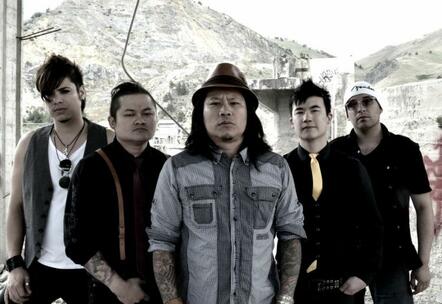New York, NY (Top40 Charts) On Thursday, June 18th, multiple organizations filed amiscus curiae, or unsolicited legal briefs, in support of Portland, Oregon-based Asian American dance-rock band, The Slants, and their pending case before the U.S Court of Appeals for the Federal Circuit. The unexpected result included bi-partisan support from the American Civil Liberties Union, The Cato Institute, The Rutherford Institute, and Pro-Football, Inc. (The Washington Redskins), who argue that The United States Patent and Trademark Office (USPTO) violated the band's rights.
The historic case began nearly half a decade ago, when the Trademark Office rejected the band's trademark registration application, claiming that the name was disparaging to persons of Asian descent. Since then, it has sparked a national conversation on the role of government intervention, self-determination, and freedom of speech. After multiple appeals, the band finally argued before a panel of the U.S. Court of Appeals for the Federal Circuit but did not prevail. In a surprise move, the court vacated that decision one week later, ordering the case to be heard en banc (before all judges of the court) on whether or not the Trademark Office's laws on disparagement violate First Amendment rights.
Now, the band has been brought to the frontlines of free speech and social justice, rallying against a law that has been disproportionately been affecting minorities. Band founder and leader
Simon Tam (also known as "Simon Young") states, "This case has become so much bigger than our attempt to register a trademark. It is all about the principle."
David Rogers, Executive Director, ACLU of Oregon says, "This case calls for an end to a law that is being used to suppress minority voices. A favorable ruling for The Slants would encourage other minority voices to come forward with their own messages of tolerance and racial justice. In contrast, the ACLU of Oregon is concerned that a ruling upholding Section 2 of the Lanham Act would discourage minority speakers from spreading these important messages."
The Cato Institute's Ilya Shapiro agrees, writing in their brief that "It is rare that a First Amendment case presents such an obvious example of both content and viewpoint discrimination by the government...Indeed, content-based restrictions on speech so plainly offend the First Amendment that this case would not have presented any difficulty or risen to en banc review if it were not for a historical oddity—the failure of courts to recognize the First Amendment implications of trademark regulation. It is time to correct this error. Trademarks meet all of the criteria of protected speech and should be treated as such."
Unexpectedly, Pro-Football, Inc. weighed in on The Slants' case after years of silence on the matter. In the Redskins brief, attorney Robert Raskopf writes, "This freewheeling ability to deprive trademark owners of significant benefits because of what they say through their marks strikes at the very heart of the First Amendment values this country holds dear." The band has repeatedly tried to distance themselves from the Redskins, stating that "Unlike Redskins, THE SLANTS is not an inherent racial slur."
"While legally similar, The Slants' case is about supporting minority groups and historically marginalized speakers," says Mat dos Santos, Legal Director, ACLU of Oregon. "The ACLU of Oregon believes it is important to protect the First Amendment rights of all, even unpopular views and distasteful speech. Without these protections, the government makes decisions for us on what kind of speech and viewpoints are acceptable in public discourse. However, the ACLU of Oregon does not support the use of racial slurs simply as a means to make money."
Despite the ongoing legal battle, the band has continued to perform and plans on releasing a new album before the end of the year. The band has no plans in abandoning the legal case. In a scathing Open Letter to the Trademark Office, Tam writes, "Like so many others who have been wrongfully accused of disparagement before me, you tried to quickly shove us aside. However, know this: we are not going away. We plan to fight you every step of the way. This is about our identity, our activism, and our art."
The Federal Circuit will now decide whether Section 2(a) of the Lanham Act is constitutional or not, and if the Trademark Office's denial for trademark registration violated the free speech rights of Tam.
























